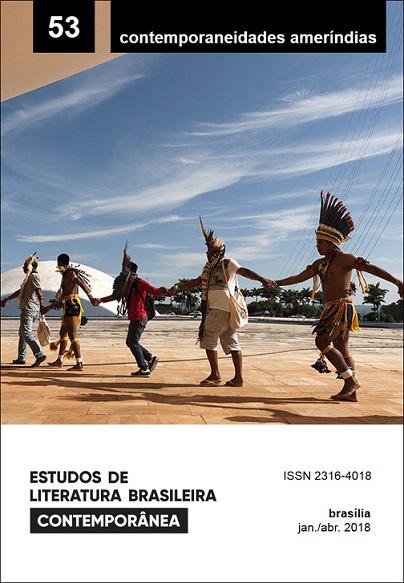A Yanomami Shaman against the philosophical-sociological discourse of modernity
DOI:
https://doi.org/10.1590/2316-40185310Abstract
In this paper, which intends to establish a dialogue between literature and philosophy-sociology, we develop a double argument. Based on the discussion of Davi Kopenawa’s and Bruce Albert’s The falling sky: words of a Yanomami Shaman and Jürgen Habermas’ philosophical-sociological theory of modernity the essay discusses: i) the distinctive characteristic of Indigenous literature. We maintain that this distinction lies in the conjunction between its self-biographical style, and the fundamental correlation between personal history and collective destiny (at the social-cultural and ecological-spiritual levels), invigorated by and based on myth, so that such a correlation between personal history and collective destiny becomes the epistemological, political anthropological and ontological key to access the Indigenous text-praxis; ii) it allows us to deconstruct an idyllic vision of Europe about itself and its caricature of primitive cultures, epistemologies and peoples (as non-modern, pre-modern ”“ because after modernity there is nothing else, as it is the evolutionary, epistemological and ontological apogee of humankind), in which, firstly, modernity is rational and generates individualization, critical thinking, emancipation and universalism, because of the separation between personal history and collective destiny, while, secondly, traditional culture does not generate rationalization, or critical thinking, or emancipation or universalism, since it is marked by the strong imbrication between personal history and collective destiny and is permeated by myth. With that, we argue that shamanism, more than modernization, can be effectively understood as the victim’s voice, as the other’s voice, allowing for a universal critical-emancipatory perspective that allows for an interconnected existence based on the correlation between personal history and collective destiny mediated by myth.
Downloads
References
ALMEIDA, Maria Inês; QUEIROZ, Sônia (Org.) (2004). Na captura da voz: as edições da narrativa oral no Brasil. Belo Horizonte: Autêntica.
COSTA, Suzane Lima (2014). Povos indígenas e suas narrativas autobiográficas. Estudos Linguísticos e Literários, Salvador, n. 50, p. 65-82, jul./dez.
FINNEGAN, Rute (2006). O significado da literatura em culturas orais. In: QUEIROZ, Sônia (Org.) A tradição oral. Belo Horizonte: Fale/UFMG. p. 64-102.
FORST, Rainer (2010). Contextos da justiça: filosofia política para além de liberalismo e comunitarismo. São Paulo: Boitempo.
GUEDES, Peonia Viana (2009). Narrando o sujeito feminino de origem indígena: práticas autobiográficas na construção de identidades pessoais e culturais. In: HARRIS, Leila Assumpção (Org.). A voz e o olhar do outro. Rio de Janeiro: Letra Capital. p. 68-80.
HABERMAS, Jürgen (1990). Pensamento pós-metafísico. Rio de Janeiro: Tempo Brasileiro.
HABERMAS, Jürgen (2002). O discurso filosófico da modernidade: doze lições. São Paulo: Martins Fontes.
HABERMAS, Jürgen (2012a). Teoria do agir comunicativo: racionalidade da ação e racionalização social São Paulo: Martins Fontes. v. I.
HABERMAS, Jürgen (2012b). Teoria do agir comunicativo: sobre a crítica da razão funcionalista São Paulo: Martins Fontes. v. II.
HUTCHEON, Linda (1991). Poética do pós-modernismo: história, teoria, ficção. Rio de Janeiro: Imago.
KLINGER, Diana Irene (2006). Escritas de si, escritas do outro: autoficção e etnografia na narrativa latino-americana contemporânea. Tese (Doutorado em Literatura) ”“ Universidade do Estado do Rio de Janeiro, Rio de Janeiro.
KOPENAWA, Davi; ALBERT, Bruce (2015). A queda do céu: palavras de um xamã yanomami. São Paulo: Companhia das Letras.
LUDMER, Josefine (2007). Literaturas pós-autônomas. Ciberletras: Revista de Crítica Literaria y de Cultura, Bronx, n. 17, p. 1-6.
MIGNOLO, Walter D. (2007). La idea de América Latina: la herida colonial y la opción decolonial. Barcelona: Gedisa.
RISÉRIO, Antonio (1993). Textos e Tribos: poéticas extraocidentais nos trópicos brasileiros. Rio de Janeiro: Imago.
SÁEZ, Oscar Calavia (2006). Autobiografia e sujeito histórico indígena. Novos Estudos (CEBRAP), São Paulo, n. 76, p. 179-195.
WEBER, Max (1987). Sociología de la religión. Madrid: Taurus. v. I.
Downloads
Published
How to Cite
Issue
Section
License
Authors who publish in this journal agree to the following terms:
a) The authors maintain the copyright and grant the journal the right of first publication, the work being simultaneously licensed under the Creative Commons Attribution License-Non Commercial 4.0 which allows the sharing of the work with acknowledgment of the authorship of the work and publication this journal.
b) Authors are authorized to enter into additional contracts separately, for non-exclusive distribution of the version of the work published in this journal (eg publish in institutional repository or as a book chapter), with authorship recognition and publication in this journal.
c) Authors are allowed and encouraged to publish and distribute their work online (eg in institutional repositories or on their personal page) after the editorial process, as this can generate productive changes, as well as increase the impact and citation of published work (See The Effect of Free Access).
d) The authors of the approved works authorize the magazine to, after publication, transfer its content for reproduction in content crawlers, virtual libraries and the like.
e) The authors assume that the texts submitted to the publication are of their original creation, being fully responsible for their content in the event of possible opposition by third parties.


